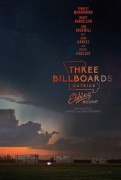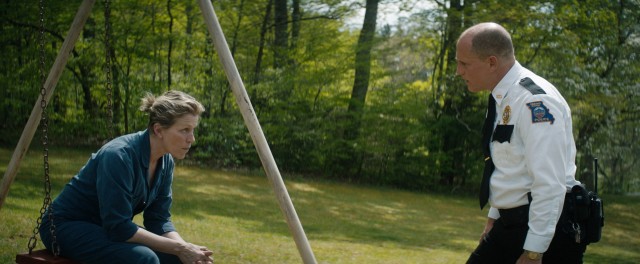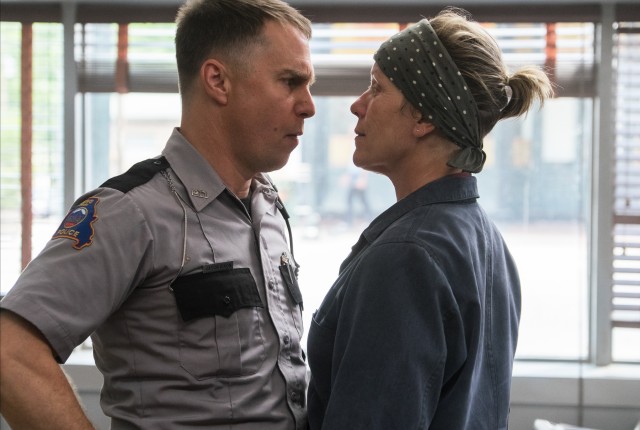Three Billboards Outside Ebbing, Missouri Movie Review
 |
Three Billboards Outside Ebbing, Missouri
Theatrical Release: November 10, 2017 / Running Time: 115 Minutes / Rating: R Writer/Director: Martin McDonagh Cast: Frances McDormand (Mildred Hayes), Woody Harrelson (William Willoughby), Sam Rockwell (Officer Jason Dixon), Abbie Cornish (Anne Willoughby), Lucas Hedges (Robbie Hayes), Zeljko Ivanek (Desk Sergeant), Caleb Landy Jones (Red Welby), Clarke Peters (Abercrombie), Samara Weaving (Penelope), John Hawkes (Charlie), Peter Dinklage (James), Brendan Sexton III (Crop-Haired Guy), Sandy Martin (Momma Dixon), Nick Searcy (Father Montgomery - uncredited) |
The colorful and creative 2008 comedy In Bruges seemed to announce writer-director Martin McDonagh as a filmmaker to watch. No one really saw his follow-up, though, Seven Psychopaths, which was good, but not good enough to keep people talking about its maker, Your first impression of the film may be that it seems very much on the nose. Mildred Hayes (Frances McDormand) stops on a country road into the titular southeastern location and looks at the long vacant billboards, taking note that the space may be purchased from Ebbing Advertising. She probably could have figured that out because it appears to be the only ad agency in the small town and sits on Main Street across from the police station. Mildred shows up with $5,000 in hand to buy the three billboards. She does and orders them to display in large black print against a red backdrop "Raped While Dying...", "And Still No Arrests?", and "How Come, Chief Willoughby?"
It's easy enough for the police to figure out who is behind the billboards and they are expectedly not too pleased with them. The billboards refer to Mildred's teenage daughter, who seven months earlier was raped and burned to death. Mildred has no answers and is grieving. Having read that keeping a case in the public eye is a boon to investigation, she purchases the billboards to put heat on police chief Willoughby (Woody Harrelson) and his seemingly useless officers, who have given her no answers while the rest of the town has moved on.
Jason Dixon (Sam Rockwell), the chief officer on the case, is especially outraged by the billboards. Unfazed by his own personal scandal involving torture of a black suspect in a different case, Dixon puts pressure on Red (Caleb Landry Jones), the wily, young business owner who has sold the ad space, to take them down. The rest of the town is mostly in agreement, partly shaded by the rumblings that Sheriff Willoughby has pancreatic cancer and is dying.
There is no need to synopsize Three Billboards any further, but this is undoubtedly a film that is rich in story and in characters. Among the latter are Mildred's ex-husband (John Hawkes), who is now dating a 19-year-old who works at the zoo and smells like it; Mildred's teenaged son (Manchester by the Sea Oscar nominee Lucas Hedges), who faces razzing from classmates over the billboards; Dixon's widowed mother (Sandy Martin), who continues to look out for her boy; and James (Peter Dinklage), the self-proclaimed town midget who displays romantic interest in Mildred.
As in his first two screenplays, McDonagh gives the cast sharp dialogue you want to revisit later and maybe quote. He also gives them all depth. Willoughby isn't a scumbag cop who's bad at his job. He's legitimately stumped by DNA that matches no one and he's also a loving husband and father of two young girls. Though clearly our heroine, Mildred isn't always the voice of reason or immune to bad decision-making. Even Dixon, who emerges as a loathsome villain, proves to have more layers to him.
In the hands of Rockwell, looking plumper and less fashionable than usual, Dixon comes close to stealing the show. It's a performance that simply has to land Rockwell his first Oscar nomination and after nearly thirty years of film acting, including numerous commendable performances in films that never really had a shot at awards, from Galaxy Quest and Matchstick Men to Moon and The Way, Way, Back, it's recognition that feels overdue. Already, though, Rockwell has a formidable competitor in the Supporting Actor category in the form of The Florida Project's Willem Dafoe, who exudes decency and similarly has been around for a long time without ever winning an Oscar (Dafoe at least was nominated twice). It was tough to imagine anyone as effective as Dafoe, but it's even tougher to imagine anyone else crashing the ranks and upstaging either of these strong showings.
McDormand, who is most associated with her work in her husband Joel Coen's films including her Oscar-winning turn in Fargo, is magnetic here as well. Her presence and the tone and content might draw comparisons, but Three Billboards lacks the deliberate eccentricity of the Coen brothers' work. To detail what gives the film its power would require spoiling, something I wouldn't even do for a far lesser film, let alone one that I enjoyed as much as this one. Suffice it to say, Three Billboards keeps you on your toes and guessing. Even when you think everything is going to come together in a positively beautiful way, the movie has more surprises for you. Its open ending is about the most perfect one you can imagine and one that will have you thinking and talking. When I saw it back in October, this became the first film in the Oscar conversation that I could get behind fully, on not just technical levels but emotional and dramatic ones too. (Since then, Lady Bird has joined it.) You'll absolutely want to see this film and the sooner you can without anyone or anything spoiling some plot points, the better.
|
Related Reviews:
DVDizzy.com | DVD and Blu-ray Reviews | New and Upcoming DVD & Blu-ray Schedule | Upcoming Cover Art | Search This Site
DVDizzy.com Top Stories:
Now in Theaters: Lady Bird • Coco • The Florida Project • Suburbicon • Blade Runner 2049 • Wonderstruck
Directed by Martin McDonagh: Seven Psychopaths | Produced by Martin McDonagh: The Guard
Frances McDormand: Fargo • Blood Simple. • Primal Fear • This Must Be the Place • Hail, Caesar!
Sam Rockwell: Everybody's Fine • The Hitchhiker's Guide to the Galaxy • Galaxy Quest • Don Verdean • Glory Daze
Woody Harrelson: The Edge of Seventeen • War for the Planet of the Apes • The Hunger Games • Kingpin • Now You See Me • Defendor
Caleb Landry Jones: The Last Exorcism • Get Out | Lucas Hedges: Manchester by the Sea | John Hawkes: Winter's Bone • Lincoln | Peter Dinklage: The Station Agent
Text copyright 2017 DVDizzy.com. Images copyright 2017 Fox Searchlight Pictures, Film 4, Blueprint Pictures.
Unauthorized reproduction prohibited.

